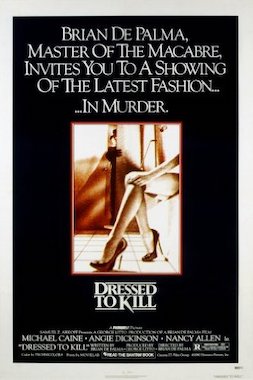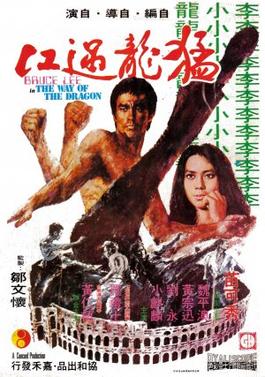Related Research Articles

Dressed to Kill is a 1980 American erotic psychological thriller film written and directed by Brian De Palma, and starring Michael Caine, Angie Dickinson and Nancy Allen. It depicts the events leading up to the brutal murder of a New York City housewife (Dickinson) before following a prostitute (Allen) who witnesses the crime, and her attempts to solve it with the help of the victim's son. It contains several direct references to Alfred Hitchcock's 1960 film Psycho.

Samuel "Sammo" Hung Kam-bo is a Hong Kong actor, martial artist, film producer and film director, known for his work in martial arts films, Hong Kong action cinema, and as a fight choreographer for other actors such as Kim Tai-chung, Jackie Chan, Yuen Biao, and Yuen Wah. Throughout the 1980s, he was part of the "Three Dragons" along with Chan and Biao; the three starred in six Hong Kong films together.
The Big Boss is a 1971 Hong Kong martial arts film directed by Lo Wei and Wu Chi-hsiang. Bruce Lee stars in his first major film in a lead role, and his first Hong Kong film since 1960. The film co-stars Maria Yi, James Tien, Tony Liu, and Nora Miao. Originally written for Tien, the leading role was given to Lee instead when the film's original director, Ng Kar-seung, was replaced by Lo Wei. The film was a critical success and excelled at the box office. Lee's strong performance overshadowed Tien, already a star in Hong Kong, and made Bruce Lee famous in Asia and eventually the world.

Fist of Fury is a 1972 Hong Kong martial arts film directed by Lo Wei and produced by Raymond Chow. The film stars Bruce Lee in his major role after The Big Boss (1971). Bruce Lee also worked as the film's action choreographer. In the film, Chen Zhen, a student of Huo Yuanjia, fights to defend the honor of the Chinese in the face of foreign aggression and also exact vengeance responsible for Huo's death.

The Way of the Dragon is a 1972 Hong Kong martial arts action comedy film co-produced and directed by Bruce Lee, who also stars in the lead role. This is Lee's only complete directorial film and the last one released during his lifetime. The film co-stars Nora Miao, Robert Wall, Wei Ping-ou and Chuck Norris.

The Hong Kong New Wave is a film movement in Chinese-language Hong Kong cinema that emerged in the late 1970s and lasted through the early 2000s until the present time.
Corey Yuen Kwai was a Hong Kong film director, film producer, action choreographer, and actor. Yuen attended the China Drama Academy and was one of the Seven Little Fortunes. In Hong Kong, he worked on several films such as Bruce Lee's Fist of Fury (1972), Hwang Jang-lee's Snuff Bottle Connection, Secret Rivals 2, The Invincible Armour, Dance of the Drunk Mantis (1979), Ninja in the Dragon's Den (1982), Millionaire's Express (1986), and Jet Li's Fong Sai-yuk II (1993), The New Legend of Shaolin (1994), High Risk, and My Father Is a Hero.

The Legend of the 7 Golden Vampires is a 1974 martial arts horror film directed by Roy Ward Baker. The film opens in 1804, when seven vampires clad in gold masks are resurrected by Count Dracula. A century later, Professor Van Helsing, known in the world for his exploits with Dracula, is recruited by a man and his seven siblings after giving a lecture at a Chinese university to take on the vampires. The film is a British-Hong Kong co-production between Hammer Film Productions and Shaw Brothers Studio.
Paul Bogart was an American television director and producer. Bogart directed episodes of the television series 'Way Out in 1961, Coronet Blue in 1967, Get Smart, The Dumplings in 1976, All In The Family from 1975 to 1979, Mama Malone in 1982, and four episodes of the first season of The Golden Girls in 1985. Among his films are Oh, God! You Devil, Torch Song Trilogy, Halls of Anger, Marlowe, Skin Game, and Class of '44. He won five Primetime Emmy Awards during his long career, from sixteen nominations. In 1991, he was awarded the French Festival Internationelle Programmes Audiovisuelle at the Cannes Film Festival.

Elliott James Murphy is an American rock singer-songwriter, novelist, record producer, and journalist.

They Call Me Bruce? is a 1982 American action comedy film directed by Elliott Hong, written by David B. Randolph and starring Johnny Yune and Margaux Hemingway. A parody of kung fu movies, it became a sleeper hit.
CINE was a non-profit film organization based in Washington, D.C. Founded in 1957 with the mission of selecting American films for international film festivals, CINE's focus evolved to supporting emerging and established producers of film, TV and digital media from all around the world through film competitions, educational panels, screenings and networking opportunities. After 61 years, CINE ceased operations in 2018.
Angela Mao Ying is a Taiwanese actress and martial artist who appeared in martial arts films in the 1970s. One of the most prominent martial artist actresses of her time, she is nicknamed "Lady Whirlwind" and "Lady Kung Fu". She was positioned as a female version of Bruce Lee.

Sylvia Chang is a Taiwanese actress, singer, director, screenwriter, and producer. In 1992, she served as a jury member at the 42nd Berlin International Film Festival. In June 2018, she was invited to become a member of the Academy of Motion Picture Arts and Sciences. In the same year, she served as a jury member at the 75th Venice International Film Festival.

Shuntarō Tanikawa was a Japanese poet and translator. He was considered to be one of the most widely read and highly regarded Japanese poets, both in Japan and abroad. The English translation of his poetry volume Floating the River in Melancholy, translated by William I. Elliott and Kazuo Kawamura and illustrated by Yoko Sano, won the American Book Award in 1989.
Robert Clouse was an American film director and producer, known primarily for his work in the action/adventure and martial arts genres. He died on February 4, 1997, in Oregon of kidney failure.
Bruce Mohr Powell Surtees was an American cinematographer, the son of Maydell and cinematographer Robert L. Surtees. He is best known for his extensive work on Clint Eastwood's films. His cinematography was compared to that of the Dollars trilogy of Sergio Leone.
Russ Kingston is an American film and television actor, editor, and cinematographer.
Tears of Buddha is a 1973 documentary film directed by Elliott Hong and filmed by cinematographer Russ Kingston.
Mang Hoi was a Hong Kong actor and action director. He won the Best Supporting Actor at the 5th Hong Kong Film Awards for Yes, Madam.
References
- ↑ "Elliott Hong". Movies & TV Dept. The New York Times . 2012. Archived from the original on November 4, 2012.
- ↑ F. Shepard, Richard (January 16, 1983). "KOREAN COMIC IN 'THEY CALL ME BRUCE'". The New York Times .
- ↑ Chicago-Sun Times
- ↑ DVD Verdict
- ↑ The New York Times
- ↑ The New York Times
- ↑ Eui Hong & Russ Kingston. Filming "Tears of Buddha". American Cinematographer, ASC Holding Corp., Vol. 54, No. 9, September 1973, Pgs. 1174–1176, 1199–1201, (MG)